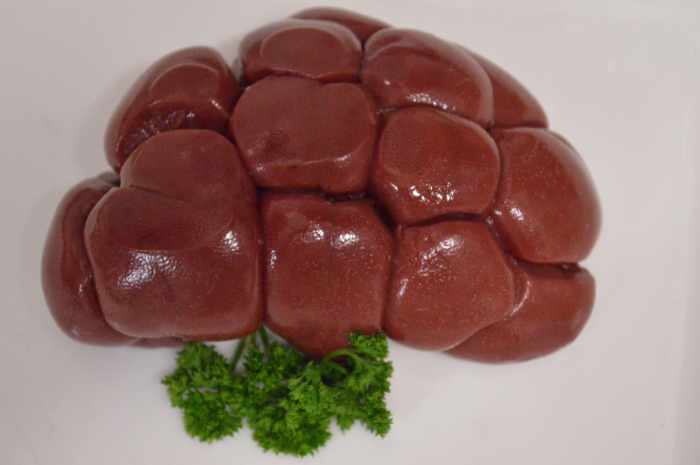Nutritional Profile of Beef Kidney
Beef kidney nutrition facts – Let’s delve into the surprisingly fascinating world of beef kidney nutrition. Forget the slightly off-putting name; this organ meat packs a nutritional punch that would make Popeye jealous. We’re talking a powerhouse of vitamins and minerals, a protein powerhouse, and a surprisingly good source of certain fats. Prepare to be amazed (and maybe slightly less squeamish).
Macronutrient Breakdown of a 3-Ounce Serving
A typical 3-ounce serving of beef kidney offers a unique macronutrient profile. While precise values can vary based on factors like the animal’s diet and preparation methods, we can present a representative breakdown. Think of this as a general guideline, not a rigidly precise laboratory analysis. Remember, your mileage may vary!
Protein is the star of the show, typically providing around 20-25 grams per serving. This contributes significantly to your daily protein needs, making beef kidney an excellent choice for those seeking to build and maintain muscle mass. It’s a high-quality protein source, boasting all the essential amino acids your body craves. Now, that’s what I call a protein party!
Fat content is relatively moderate, usually falling within the range of 5-8 grams per serving. While this might seem like a lot, the majority of the fat is unsaturated, which is generally considered healthier than saturated fat. Don’t be afraid of healthy fats; they’re essential for various bodily functions. This isn’t the kind of fat that will clog your arteries; instead, it’s the kind that helps keep your body running smoothly.
Carbohydrates are minimal in beef kidney, typically less than 1 gram per serving. This makes it a great choice for those following low-carb diets or simply watching their carbohydrate intake. It’s a low-carb champion!
Daily value percentages vary depending on individual dietary needs and overall calorie intake, but a 3-ounce serving of beef kidney can provide a substantial percentage of your daily protein requirement and a notable contribution to your daily fat intake.
Micronutrient Content of Beef Kidney, Beef kidney nutrition facts
Beyond the macronutrients, beef kidney is a treasure trove of essential micronutrients. It’s like a tiny, edible multivitamin! The following table provides a glimpse into this impressive array of vitamins and minerals. Note that these values are approximate and can fluctuate depending on several factors.
| Micronutrient | Amount (per 3-ounce serving, approximate) | % Daily Value (approximate) | Health Benefits (brief summary) |
|---|---|---|---|
| Iron | ~7mg | ~40% | Essential for oxygen transport and energy production. |
| Zinc | ~4mg | ~25% | Supports immune function and wound healing. |
| Potassium | ~400mg | ~9% | Important for maintaining fluid balance and blood pressure. |
| Vitamin B12 | ~15mcg | ~60% | Crucial for nerve function and red blood cell formation. Vegetarians, take note! |
| Vitamin A | ~100mcg RAE | ~11% | Supports vision, immune function, and cell growth. |
Bioactive Compounds and Beneficial Substances
Beef kidney isn’t just a collection of nutrients; it also contains various bioactive compounds that contribute to its potential health benefits. While research is ongoing, some studies suggest that certain compounds in beef kidney may possess antioxidant and anti-inflammatory properties. Think of it as nature’s little secret weapon against free radicals and inflammation. It’s a natural powerhouse of goodness! Further research is needed to fully understand the extent of these effects.
Health Benefits and Risks Associated with Beef Kidney Consumption

Let’s delve into the fascinating, and slightly unsettling, world of beef kidney consumption. While the thought might not immediately conjure images of culinary delight for everyone, this often-overlooked organ meat packs a nutritional punch that deserves a closer look. We’ll explore the potential upsides and downsides, ensuring you’re armed with the knowledge to make informed choices about this rather unique food.Beef kidney, like other organ meats, is a nutritional powerhouse.
Its high concentration of various vitamins and minerals contributes significantly to overall health. However, its richness also comes with some potential caveats, mainly concerning cholesterol and purine content. Understanding both sides of the coin is crucial for responsible consumption.
Nutritional Benefits of Beef Kidney
Beef kidney boasts an impressive array of nutrients beneficial for various bodily functions. Its high iron content makes it a boon for individuals prone to anemia, while its substantial vitamin B12 contribution supports healthy nerve function and red blood cell formation. Furthermore, the presence of various other B vitamins, along with minerals like zinc and selenium, contributes to a robust immune system and overall cellular health.
Consuming beef kidney in moderation can be a surprisingly effective way to supplement your diet with essential nutrients that might be lacking in a typical Western diet. Think of it as a tiny, intensely flavorful nutritional bomb.
Potential Health Risks Associated with High Beef Kidney Consumption
While beef kidney offers significant nutritional advantages, it’s important to acknowledge the potential downsides of excessive consumption. Its relatively high cholesterol content is a concern for individuals with pre-existing cardiovascular issues or those at risk of developing them. Similarly, the elevated purine levels can exacerbate gout in susceptible individuals. Therefore, moderation is key. Imagine it like a delicious but potent spice – a little goes a long way, and too much can overwhelm the palate (and your system).
Consult your physician if you have any concerns regarding your cholesterol or purine intake.
Comparison of Beef Kidney with Other Organ Meats
Now for a comparative analysis of beef kidney against its organ meat brethren – liver and heart. Understanding their relative nutritional profiles can help you make informed choices about incorporating organ meats into your diet.
The following table summarizes key differences:
| Nutrient | Beef Kidney | Beef Liver | Beef Heart |
|---|---|---|---|
| Iron (mg/100g) | High | Very High | Moderate |
| Vitamin B12 (mcg/100g) | High | Very High | Moderate |
| Cholesterol (mg/100g) | High | High | Moderate |
| Purines (mg/100g) | High | Moderate | Low |
Note: The terms “High,” “Very High,” “Moderate,” and “Low” are relative comparisons and not precise quantitative values. Actual values vary depending on factors like the animal’s diet and age.
Beef Kidney in a Balanced Diet: Beef Kidney Nutrition Facts

Let’s face it, beef kidney isn’t exactly the star of every dinner party. But this often-overlooked organ meat packs a serious nutritional punch, and with a little culinary creativity, it can easily become a surprisingly delicious and valuable part of a balanced diet. Think of it as the underdog of the protein world, ready to steal the show with the right preparation and supporting cast.Integrating beef kidney into a balanced diet requires careful planning, ensuring it complements other nutrient-rich foods rather than overshadowing them.
Yo, so beef kidneys? Crazy high in iron, right? But if you’re watching your weight, you gotta balance it. Checking out stuff like panera nutrition facts weight watchers can help you understand portion sizes and calorie counts for other meals. Then you can properly incorporate those iron-packed kidneys into your diet without derailing your fitness goals, you know?
The key is to balance its strong flavor and texture with gentler counterparts, creating a harmonious and satisfying meal. Proper preparation is crucial for maximizing its nutritional benefits and minimizing any off-putting qualities.
A Sample Meal Plan Incorporating Beef Kidney
This sample meal plan showcases beef kidney’s versatility and its role in a balanced, varied diet. The focus is on nutrient density and flavor synergy. Remember, portion sizes should be adjusted to individual caloric needs.
- Breakfast: Oatmeal with berries and nuts. This provides complex carbohydrates, antioxidants, and healthy fats, setting a good foundation for the day.
- Lunch: A large salad with grilled chicken or fish, various vegetables (lettuce, spinach, carrots, bell peppers), and a light vinaigrette. This offers lean protein, vitamins, and fiber.
- Dinner: Beef kidney stew with root vegetables (carrots, potatoes, parsnips) and a side of steamed green beans. The stew provides iron, B vitamins, and other essential nutrients from both the kidney and vegetables. Green beans add more vitamins and fiber.
- Snacks: Greek yogurt with fruit, a handful of almonds, or a small piece of fruit. These provide protein, healthy fats, and additional vitamins and minerals.
Healthy and Palatable Beef Kidney Preparation
The secret to enjoying beef kidney lies in proper preparation. Its strong flavor and potentially tough texture can be easily mitigated with careful cooking techniques. Overcooking is the enemy; it leads to dryness and intensifies the gaminess.
“The goal is to achieve a tender, flavorful kidney that melts in your mouth, not one that resembles a hockey puck.”
Methods like braising or stewing, which involve slow cooking in liquid, are ideal. Marinating the kidney beforehand in a mixture of acidic ingredients (like wine or lemon juice) and herbs helps tenderize the meat and infuse it with flavor. Careful trimming of excess fat is also crucial. Remember, a well-prepared beef kidney is a culinary delight, not a culinary challenge.
Complementary Foods for Beef Kidney
Pairing beef kidney with the right complementary foods enhances both its nutritional value and its flavor profile. The strong, slightly gamey taste of beef kidney benefits from being balanced with sweeter, earthy, or acidic flavors.
- Root vegetables: Carrots, potatoes, parsnips, and sweet potatoes offer sweetness and earthiness that complement the kidney’s richness.
- Onions and garlic: These aromatic vegetables add depth and complexity to the dish, masking any potential off-flavors.
- Herbs and spices: Thyme, rosemary, bay leaf, and black pepper enhance the kidney’s flavor without overpowering it.
- Acids: A splash of red wine, lemon juice, or balsamic vinegar helps to cut through the richness and tenderize the meat.
- Dark leafy greens: Spinach or kale provide additional vitamins and minerals, creating a nutritionally balanced meal.
Beef Kidney and Specific Dietary Needs

Beef kidney, that surprisingly delicious and surprisingly nutritious organ meat, presents a unique nutritional profile that warrants careful consideration for individuals with specific dietary needs. While it boasts impressive levels of protein and various vitamins and minerals, its high concentration of certain components might pose challenges for some. Let’s delve into the fascinating world of beef kidney and its compatibility with various dietary restrictions.
Navigating the nutritional landscape of beef kidney requires a nuanced understanding of its composition. Its richness in certain nutrients can be both a blessing and a curse, depending on individual dietary requirements. For instance, while its high protein content is beneficial for those seeking muscle growth, its relatively high sodium content could be problematic for individuals on low-sodium diets.
This section will clarify the suitability of beef kidney for various dietary needs, offering a practical guide to informed consumption.
Beef Kidney Suitability for Different Diets
The following table summarizes the suitability of beef kidney for various dietary needs. Remember, moderation is key, and consulting a registered dietitian or healthcare professional is always recommended before making significant dietary changes, especially if you have pre-existing health conditions.
| Dietary Need | Suitability | Considerations | Example |
|---|---|---|---|
| Low-Sodium Diet | Generally unsuitable | Beef kidney is naturally high in sodium. Careful portion control and preparation methods (e.g., rinsing, low-sodium cooking methods) may help, but it’s unlikely to be a regular feature. | A person with hypertension might need to severely limit or avoid beef kidney. |
| High-Protein Diet | Highly suitable | Beef kidney is an excellent source of high-quality protein, beneficial for muscle building and repair. | Bodybuilders or athletes aiming for increased muscle mass could incorporate it strategically. |
| Low-Purine Diet | Unsuitable | Beef kidney is relatively high in purines, which can be problematic for individuals with gout or a history of kidney stones. | Someone with gout should avoid or significantly restrict beef kidney consumption. |
| Iron-Deficiency Anemia | Potentially beneficial | Beef kidney is a rich source of iron, which can aid in combating iron-deficiency anemia. However, the high purine content should be considered. | Individuals with iron deficiency might benefit from small, controlled portions, especially if combined with vitamin C-rich foods to enhance iron absorption. Consult a doctor before including it in your diet. |
Potential Drug Interactions with Beef Kidney Consumption
While not extensively studied, there’s a theoretical possibility of interactions between beef kidney consumption and certain medications. This is primarily due to its high vitamin K content, which can affect the efficacy of anticoagulant medications like warfarin. Always consult with your physician or pharmacist before incorporating beef kidney into your diet if you are on any medication, particularly anticoagulants or medications affecting kidney function.
The high levels of certain minerals in beef kidney, such as potassium, could also potentially interact with medications that affect potassium levels. Therefore, monitoring your potassium intake is crucial, especially if you have kidney disease or are taking medications that affect potassium balance. Individual responses vary widely, highlighting the importance of professional medical advice.
Expert Answers
Is beef kidney high in cholesterol?
Yes, beef kidney is relatively high in cholesterol compared to leaner cuts of meat. Individuals with high cholesterol should consume it in moderation.
Can pregnant women eat beef kidney?
While beef kidney is a good source of iron and other nutrients beneficial during pregnancy, it’s crucial to ensure it’s thoroughly cooked to avoid foodborne illnesses. Consult with a doctor or registered dietitian for personalized advice.
How do I reduce the strong taste of beef kidney?
Soaking the kidney in milk or buttermilk for several hours before cooking can help mitigate the strong flavor. Properly trimming excess fat and using complementary spices also helps.
Are there any specific preparation methods to minimize potential health risks?
Thorough cooking is essential to eliminate any potential pathogens. Avoid overcooking, which can make it tough. Proper trimming of fat can reduce cholesterol content.
